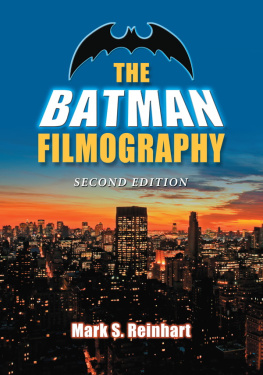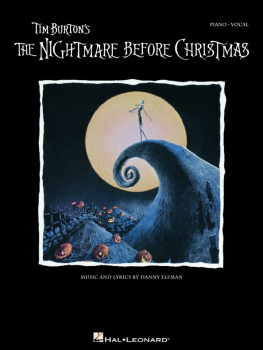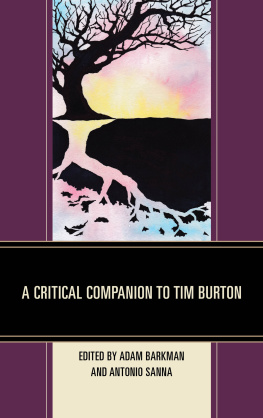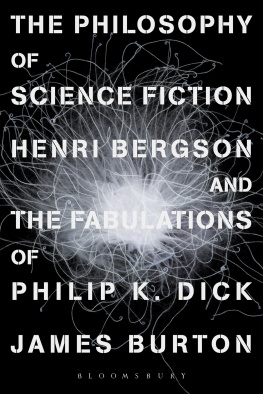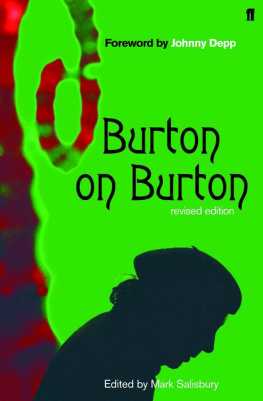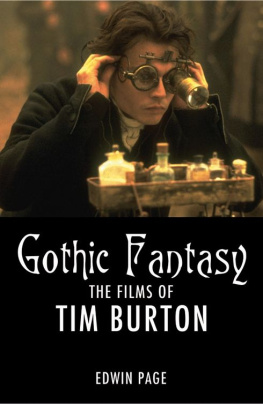The Philosophy of Tim Burton
THE PHILOSOPHY OF
TIM BURTON
Edited by
JENNIFER L. MCMAHON

Copyright 2014 by The University Press of Kentucky
Scholarly publisher for the Commonwealth,
serving Bellarmine University, Berea College, Centre College of Kentucky,
Eastern Kentucky University, The Filson Historical Society, Georgetown College,
Kentucky Historical Society, Kentucky State University, Morehead State
University, Murray State University, Northern Kentucky University, Transylvania
University, University of Kentucky, University of Louisville, and Western
Kentucky University.
All rights reserved.
Editorial and Sales Offices: The University Press of Kentucky
663 South Limestone Street, Lexington, Kentucky 40508-4008
www.kentuckypress.com
Library of Congress Cataloging-in-Publication Data
The philosophy of Tim Burton / edited by Jennifer L. McMahon.
pages cm
Includes bibliographical references and index.
ISBN 978-0-8131-4462-7 (hardcover : alk. paper)
ISBN 978-0-8131-4464-1 (pdf : alk. paper) ISBN 978-0-8131-4463-4 (epub)
1. Burton, TimCriticism and interpretation. I. McMahon, Jennifer L. editor of compilation.
PN1998.3.B875P55 2014
791.4302'33092dc23 | 2014005231 |
This book is printed on acid-free paper meeting the requirements of the American National Standard for Permanence in Paper for Printed Library Materials.

Manufactured in the United States of America.

| Member of the Association of American University Presses |
CONTENTS
Ken Hada
Ryan Weldon
Daniel Sullivan
Mark Walling
Paul A. Cantor
Steve Benton
Kevin S. Decker
Kimberly Baltzer-Jaray
Jennifer L. Jenkins
Deborah Knight and George McKnight
Jennifer L. McMahon
David LaRocca
Debbie Olson
INTRODUCTION
No contemporary director-producer has as deliciously macabre a signature as Tim Burton. Known for his quirky characters and delightfully sinister settings, Burton displays an undeniable knack for the fantastic. Alluding to sources as varied as Lewis Carroll, Mary Shelley, Washington Irving, Edward Gorey, Salvador Dali, and Dr. Seuss, Burtons creations fascinate audiences by virtue of their ability to elicit both alarm and wonder. And Burtons influence extends beyond the screen. After over a decade spent establishing a reputation primarily in the cinematic arts, in 2007 Burton released The Melancholy Death of Oyster Boy and Other Stories, a collection of short fiction. Then, in 2009, he received critical acclaim for an exhibition of his original artwork at the Museum of Modern Art (MoMA) in New York. This multimedia collection was exhibited at the Los Angeles County Museum of Art in 2011. The next year, 2012, brought the release of several Burton productions, including Dark Shadows, Abraham Lincoln: Vampire Hunter (co-produced with Timur Bekmambetov), and a feature-length 3-D remake of Frankenweenie. As the variety and popularity of his works suggest, whether in an offbeat animated feature, a box-office hit, a collection of short fiction, or an exhibit in the visual arts, Burton pushes the envelope of the imagination with his uncanny productions and in doing so has emerged as a powerful force in contemporary culture.
This collection examines the philosophical significance of Burtons corpus, a body that includes Beetlejuice (1988), Batman (1989), Edward Scissorhands (1990), Batman Returns (1992), The Nightmare Before Christmas (1993), Mars Attacks! (1996), Sleepy Hollow (1999), Planet of the Apes (2001), Big Fish (2003), Corpse Bride (2005), Charlie and the Chocolate Factory (2005), Sweeney Todd (2007), 9 (2009), Alice in Wonderland (2010), and Dark Shadows (2012). Burtons work invites philosophical consideration for a variety of reasons. Clearly, to the extent his most prominent achievements have been within the visual and performing arts, his work invites aesthetic analysis. Aesthetics is the philosophical discipline that studies art. Philosophers who specialize in aesthetics consider questions such as What is the nature of art? What is the nature of artistic genius? Can art educate? And what role do negative emotions play in art? Certainly, when one considers Burtons unique style, often disturbing content, and popular appeal, one can see how the aforementioned questions can be directed to Burtons corpus. We can ask whether his work should be considered art, whether he should be regarded as a genius, whether his works educate, and whether his ominous style augments or compromises the aesthetic value of his work. But Burtons work inspires more than aesthetic examination. In a less disturbing fashion than Sweeney Todd, Burtons characters and plots provide ample meat for satisfying discussions regarding other long-standing philosophical topics, including identity and authority. Indeed, this collection is organized around these three core topics: identity, authority, and art.
(18131855) and R. D. Laing (19271989), Sullivan argues that a preoccupation with fantasy worlds offers both dangers and delights. Finally, in his comparative essay, Johnny Depp Is a Big Baby! The Philosophical Significance of Tim Burtons Preoccupation with Childhood Consciousness in Edward Scissorhands and Ed Wood, Walling examines current research in cognitive science that suggests that, rather than perceiving less than their mature counterparts, children perceive more, and their cognitive apparatus is epistemologically unique for this reason. Walling argues that Burtons nostalgia for childhood is not anchored primarily in nostalgia for the innocence of youth but instead in the unique cognitive awareness that children exemplify and that warrants further examination.
that we can discern information regarding our cultural self-understanding from the iconic figure of the Caped Crusader. Finally, in Burtonology: Metaphysics, Epistemology, Essences, Christmas, and Vincent Price, Kimberly Baltzer-Jaray turns the conversation to broader epistemological issues, specifically questions regarding what we can and cannot know. Focusing primarily on Immanuel Kants (17241804) distinction between noumena and phenomena and incorporating material from Thomas Nagels (1937) What Is It Like to Be a Bat?, Baltzer-Jaray looks at The Nightmare Before Christmas and Vincent to see if we have any authority to claim knowledge of anything outside our own minds.
and expands the discussion to explore not only how Burton idealizes childhood but also how his works might affect children.
Overall, the essays in this collection aim to invite unique and provocative discussion of one of this centurys most provocative and unique figures. Tim Burtons singular style and range of influence warrant examination of his work from a philosophical perspective. Philosophers trade in, or at least aim at, the discernment of truth. There is no doubt that Tim Burton has helped shape our popular perceptions of identity, authority, and the aesthetic. The essays herein seek simply to encourage the same degree of critical reflection on Burton that Burton encourages in his audiences.
Next page



